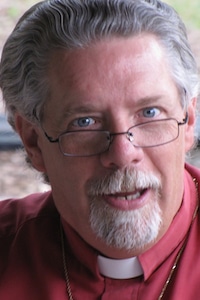In life’s complex tapestry, where prejudice, -isms and misunderstanding can still cast long shadows, the LGBTQ+ community has navigated through storms of discrimination and rejection. And within that struggle lies an opportunity — a clarion call to embody the deepest teachings of love, compassion and forgiveness as professed in the Gospel.
This Pride Month, I want to challenge you to take this embodiment seriously, even while fully acknowledging that it’s certainly easier said than done. In fact, many of my closest friends say that there are limits to the love we offer, the compassion we dispense and the forgiveness we give to those who hate us and wish us nothing but harm and maybe even some sort of eternity in whatever their personal version of “hell” is.
But here’s what the unforgiving among us miss out on: The act itself is just the start of a truly transformative process. Yet we so often struggle to even reach that beginning.
Forgiveness is a decision to release feelings of resentment or vengeance toward a person(s) who has harmed us.
Forgiveness is, as the old adage goes, a gift you give yourself. Without forgiveness, we tether ourselves to the bitterness of the past, denying ourselves the freedom to move toward a future of hope and unity. Are we a better reflection of God’s love when we argue the Bible with someone, or when we forgive them and move on? Is there anywhere in the Gospel where Jesus says the failure to forgive is the key to strengthening our spirituality, erasing our doubts and reinforcing our relationships?
To be clear, the challenge to forgive isn’t meant to diminish the very real pain and injustice we regularly face. It is instead a profound invitation to transcend barriers and be the vanguard of love’s radical inclusivity. Until we reach this point, we will never understand the real meaning of “whosoever.”
Jesus, after all that he had been through in his last moments in this world, “forgave his murderers” — and what are we left with as Christians?
If there is no forgiveness, there is no life.
Our lives flourish with energy, enthusiasm, gusto and purpose when forgiveness irrigates the soul’s arid and decaying patches. It is not merely about surviving, but thriving. It’s our rightful destiny, and it cannot be achieved if we are shackled by resentment.
If there is no forgiveness, we risk having our spirits crushed in a landslide of animosity and hatred.
This is when one picks up a gun, swings a bat or throws rocks.
To nurture a spirit capable of soaring, we must excavate any contempt buried deep within and replace it with empathy. As we dismantle the barricades we’ve built to protect our wounds, we create space for reconciliation and understanding.
Maybe the most important part of this challenge is the recognition that:
If there is no forgiveness, we risk obscuring the message of the Gospel.
The core of Christian theology, progressive or otherwise, is love. Love does not discriminate, nor does it seek to harm. Its foundation is built on understanding, compassion — and importantly, forgiveness. To truly live the Gospel, we must endeavor to exemplify these precepts, even amidst the storm.
This forgiveness challenge is not passive; it requires engaging action—and it starts within. Here’s how you can partake:
- Introspection: Reflect on the hurts you’ve endured, acknowledge the pain, and recognize the power that forgiveness can provide in your healing process
- Outreach: Engage in dialogue with others in the community to offer and seek forgiveness. Healing is magnified when shared.
- Advocacy: Use your experiences to advocate for love and forgiveness, becoming ambassadors of hope.
- Education: Share teachings on forgiveness that align with progressive Christian values to expand understanding within and outside the community.
- Support: Offer a supportive space for those struggling to forgive, and extend empathy to those in the throes of this challenging process.
And most importantly:
6. Live the Gospel Message: Day by day, act and speak from a place of love and forgiveness, turning theory into practice and faith into action.
In undertaking this challenge, we’re not denying the reality of injustice or making excuses. Rather, we’re choosing to rise above it, to mirror the acceptance and love Jesus exemplified. Remember when Peter cut off the ear of a soldier in the garden? Jesus’ immediate response was to heal the solider and command that the swords be put away.
In embracing forgiveness, the LGBTQ+ community has the opportunity to do what we’ve always done: Lead by our example, showing the world that even in the face of adversity we can love profoundly, forgive deeply, and build bridges toward hope and acceptance.
Pride Month is here, and so is the challenge to forgive. Will you join me in echoing the message of the Gospel through your life?
With love and inclusivity, we can illuminate the path toward a more compassionate world, one heart at a time.

Editor-in-Chief of Whosoever and Founding and Senior Pastor of Gentle Spirit Christian Church of Atlanta, Rev. Paul M. Turner (he/him) grew up in suburban Chicago and was ordained by the Universal Fellowship of Metropolitan Community Churches in 1989. He and his husband Bill have lived in metro Atlanta since 1994, have been in a committed partnership since the early 1980s and have been legally married since 2015.
